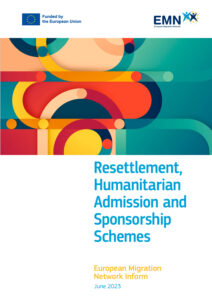Conflicts in different world regions have led to an increase in migratory movements to neighbouring countries, with approximately 72% of refugees and forcibly displaced persons in 2021 being hosted in developing countries. This has created an imbalance between developed and developing countries as well as resulting in people seeking alternative places of refuge through risky and irregular routes. Resettlement, humanitarian admission, and sponsorship schemes offer protection and durability to displaced persons while alleviating pressure in countries of first asylum. These schemes also serve as a crucial tool for demonstrating global solidarity with non-EU countries.
The term “resettlement” means selecting and transferring refugees from the country where they first sought protection to a third country that agrees to accept them as permanent residents. The UNHCR is responsible for identifying and referring refugees for resettlement based on established categories and protection risks.
The majority of EMN Member Countries have implemented resettlement programmes between 2016 and 2022, although experiences vary greatly. While some countries like Finland, Sweden, and the Netherlands have well-established national programs, most EMN Member Countries have limited experience and rely on the EU Resettlement Programme.
